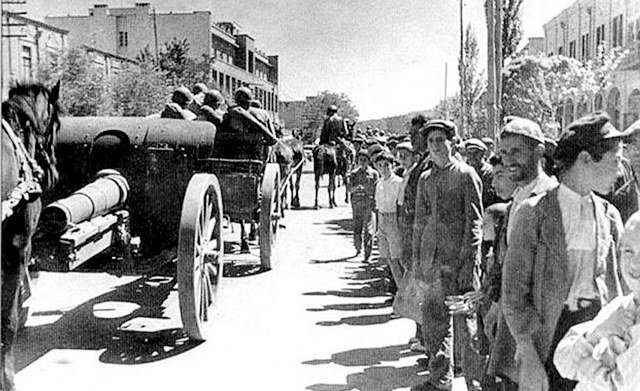YEREVAN, JULY 28, ARMENPRESS. One of the bloodiest military conflicts in the human history - the First World War broke out exactly 100 years ago, in 1914, on July 28. Most of the countries existing at that time were involved in the war.
As reports "Armenpress", World War I took place between 2 groups of powers - the German-Austrian (Germany, Austria-Hungary, Turkey, from 1915 also Bulgaria) and the Entente (Britain, Russia, France, Serbia, from 1917 the U.S.A.). The war ended in the victory of the Entente and the collapse of the Austro-Hungarian, Ottoman, Russian, German Empires, and the number of the world’s states reached 71 from 59.
The immediate trigger for war was the 28 June 1914 assassination of Archduke Franz Ferdinand of Austria, heir to the throne of Austria-Hungary, by Yugoslav nationalist Gavrilo Princip in Sarajevo. This set off a diplomatic crisis when Austria-Hungary delivered an ultimatum to the Kingdom of Serbia, and international alliances formed over the previous decades were invoked. Within weeks, the major powers were at war and the conflict soon spread around the world. On 28 July, the Austro-Hungarians fired the first shots in preparation for the invasion of Serbia. As Russia mobilized, Germany invaded neutral Belgium and Luxembourg before moving towards France, leading Britain to declare war on Germany. After the German march on Paris was halted, what became known as the Western Front settled into a battle of attrition, with a trench line that would change little until 1917. Meanwhile, on the Eastern Front, the Russian army was successful against the Austro-Hungarians, but was stopped in its invasion of East Prussia by the Germans. Germany attacked Luxembourg on 2 August and on 3 August declared war on France. On 4 August, after Belgium refused to permit German troops to cross its borders into France, Germany declared war on Belgium as well. Britain declared war on Germany on 4 August 1914, following an "unsatisfactory reply" to the British ultimatum that Belgium must be kept neutral. In November 1914, the Ottoman Empire joined the war, opening fronts in the Caucasus, Mesopotamia and the Sinai. The Ottoman Empire joined the Central Powers in the war, the secret Ottoman–German Alliance having been signed in August 1914. It threatened Russia's Caucasian territories. In Asia Minor itself, the Ottoman Turks conducted large scale massacres of the indigenous Greek, Assyrian and Armenian Christian populations in the form of the Greek Genocide, Armenian Genocide and Assyrian Genocide, leading these peoples to join the war on the side of the Russians and British. In the Caucasian front from December 9, 1914 to January 5, 1915 near Sarighamish the Russian army utterly defeated the Turkish army having about 90 thousand soldiers and the Turkish Minister of War Enver Pasha had a narrow escape from being taken a prisoner. The Russians expelled the Turks from Atrpatakan province of Iran. In May 1915 the Russians took Van with the support of the Armenian voluntary detachments. In 1916 Germany made a major attack in Verdun in Western Front (the longest battle of the First World War), where the sides did not reach a decisive success. By the time the battle ended almost one million casualties had been incurred in roughly equal numbers on either side. In the Caucasian front the Russian troops, undertaking a successful attack in 1916 occupied Karin, Yerznka, Mamakhatun, Trabzon, Bitlis, and other areas reaching to Sebastia. However the Russian withdrawal from the war in 1917 led to Armenian and Assyrian forces, who had hitherto inflicted a series of embarrassing defeats upon the far larger forces of the Ottomans and their allies, being cut off from supply lines, outnumbered, outgunned and isolated, forcing them to fight and flee towards British lines in northern Mesopotamian.
In Compiègne the Armistice between the Allies and Germany was signed, Germany surrendered and World War I, which lasted 4 years, 3 months, and 10 days, ended on 11 November 1918. It was one of the deadliest conflicts in history, paving the way for major political changes, including revolutions in many of the nations involved. About 10 million were killed, 20 million people were injured and disabled, the damage was the average of 1/3 in national wealth of the participating countries.
 11:46, 28 July 2014
11:46, 28 July 2014




















